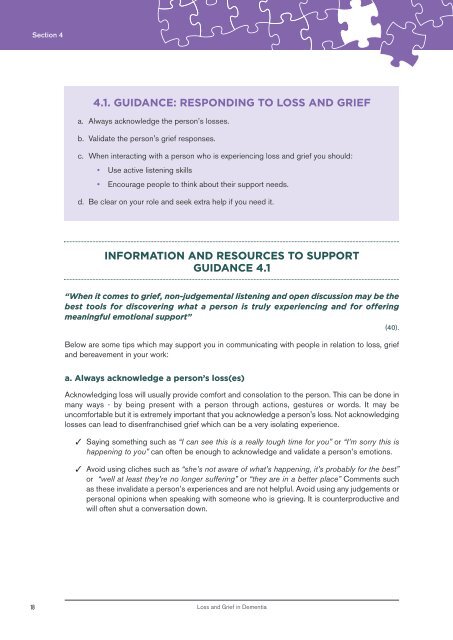Loss and Grief in Dementia
Final-Guidance-Document-3-Loss-Grief
Final-Guidance-Document-3-Loss-Grief
You also want an ePaper? Increase the reach of your titles
YUMPU automatically turns print PDFs into web optimized ePapers that Google loves.
Section 4<br />
4.1. GuIdAnCe: ReSpOndInG tO LOSS And GRIef<br />
a. Always acknowledge the person’s losses.<br />
b. Validate the person's grief responses.<br />
c. When <strong>in</strong>teract<strong>in</strong>g with a person who is experienc<strong>in</strong>g loss <strong>and</strong> grief you should:<br />
• Use active listen<strong>in</strong>g skills<br />
• Encourage people to th<strong>in</strong>k about their support needs.<br />
d. Be clear on your role <strong>and</strong> seek extra help if you need it.<br />
InfORmAtIOn And ReSOuRCeS tO SuppORt<br />
GuIdAnCe 4.1<br />
“When it comes to grief, non-judgemental listen<strong>in</strong>g <strong>and</strong> open discussion may be the<br />
best tools for discover<strong>in</strong>g what a person is truly experienc<strong>in</strong>g <strong>and</strong> for offer<strong>in</strong>g<br />
mean<strong>in</strong>gful emotional support”<br />
(40).<br />
Below are some tips which may support you <strong>in</strong> communicat<strong>in</strong>g with people <strong>in</strong> relation to loss, grief<br />
<strong>and</strong> bereavement <strong>in</strong> your work:<br />
a. Always acknowledge a person’s loss(es)<br />
Acknowledg<strong>in</strong>g loss will usually provide comfort <strong>and</strong> consolation to the person. This can be done <strong>in</strong><br />
many ways - by be<strong>in</strong>g present with a person through actions, gestures or words. It may be<br />
uncomfortable but it is extremely important that you acknowledge a person's loss. Not acknowledg<strong>in</strong>g<br />
losses can lead to disenfranchised grief which can be a very isolat<strong>in</strong>g experience.<br />
3 Say<strong>in</strong>g someth<strong>in</strong>g such as “I can see this is a really tough time for you” or “I’m sorry this is<br />
happen<strong>in</strong>g to you” can often be enough to acknowledge <strong>and</strong> validate a person’s emotions.<br />
3 Avoid us<strong>in</strong>g cliches such as “she’s not aware of what’s happen<strong>in</strong>g, it’s probably for the best”<br />
or “well at least they’re no longer suffer<strong>in</strong>g” or “they are <strong>in</strong> a better place” Comments such<br />
as these <strong>in</strong>validate a person’s experiences <strong>and</strong> are not helpful. Avoid us<strong>in</strong>g any judgements or<br />
personal op<strong>in</strong>ions when speak<strong>in</strong>g with someone who is griev<strong>in</strong>g. It is counterproductive <strong>and</strong><br />
will often shut a conversation down.<br />
18<br />
<strong>Loss</strong> <strong>and</strong> <strong>Grief</strong> <strong>in</strong> <strong>Dementia</strong>


